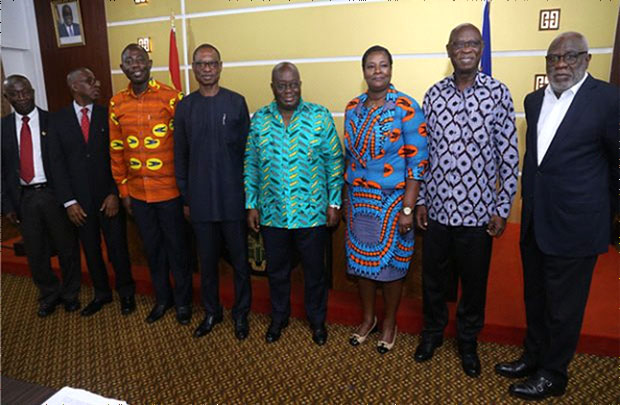President Nana Akufo Addo with the PURC board
The Public Utilities Regulatory Commission (PURC) has initiated the process for examination and approval of electricity and water tariffs for 2018.
This is in accordance with the PURC Act, 1977 (Act 538).
The 2018 major tariff review commenced by way of soliciting inputs from all stakeholders of the Commission and the general public.
A release issued in Accra signed by Mami Dufie Ofori, Executive Secretary of PURC, said it has subsequently received proposals from the utility companies, namely Volta River Authority (VRA), Ghana Grid Company (GRIDCo), Electricity Company of Ghana (ECG), Northern Electricity Distribution Company (NEDCo), Ghana Water Company Limited (GWCL), Enclave Power Company (EPC), Ghana Chamber of Telecommunications, including Government of Ghana.
“Analysis of the proposals received is ongoing. The general public is therefore being reminded to submit inputs as requested in PURC’s earlier advertisement to the public in respect of the major tariff review on or before the deadline of 31 January, 2018. This is to create an environment of transparency and fair hearing for all stakeholders of the utility service industry.”
It would be recalled that President Nana Addo Dankwa Akufo-Addo recently announced an average of 14 percent reduction in electricity tariffs for non-residential users in the country during the opening of the 8th Salon Academy of the National Association of Beauticians and Hairdressers, held at the Mensah Sarbah Hall, University of Ghana, Legon.
That, according to him, should take effect in January 2018.
“From January this year, the non-residential tariff rate, which is the rate which includes all of you here, is being reduced by an average of 14 percent. For barbers, it is being reduced by 18 percent; for hairdressers and beauticians, 15.7 percent, and for tailors, 9.8 percent,” he emphasised.
Government earlier in the year promised to reduce electricity tariffs by between 13 and 21 percent for residential consumers and industry respectively.
Finance Minister, Ken Ofori Atta, during his second budget presentation to Parliament in November last year hinted of a reduction to 13 percent, after describing how the power crisis between 2013 and 2015 affected individuals and businesses in Ghana.
A business desk report


